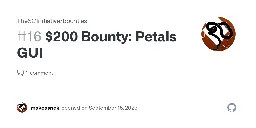Is that data compressible? A few GB for an input or output file isn't entirely unmanageable from our perspective. Not ideal, but workable. What are some popular OSS tools used in your field?
Bioinformatics
This is an excellent field for our proof of concept, just looking for a specific app to start with.
BOINC and folding@home are similar in how they work in that they are both volunteer computing platforms. Folding@home is closed source, proprietary, run by a single research group, BOINC is open source and used by many different research groups working on various topics from health to astrophysics.
The idea here is to build a BOINC server where researchers can submit work to the server and get results without having to run their own BOINC server in the process.
Suggestions for popular open source science app for a BOINC distributed computing proof-of-concept?
I work at an open science NGO that has been approached by a developer who is interested in making a public portal [email protected] BOINC project. The basic idea is that scientific researchers could submit workunits for a number of popular science apps (molecular modeling etc) to be distributed and crunched by volunteers using BOINC. Essentially, a way for them to harness the petaflops of free processing power offered by the BOINC network without having to run their own BOINC server.
In order to make the proof-of-concept, we are looking for an science app which:
- Is open source and runs on Linux
- Has a large userbase
- Has no way to get access to compute power for it for free or cheap without making your own HPC cluster or other work distribution system
- Takes a long compute time and takes at least a couple hours to run on a standard consumer machine
- Can have tasks split into smaller sub-tasks to be run on several machines
Bonus points for:
- Tasks have a determinate output, meaning the results are the same for a given task no matter what kind of computer they are run on. This makes it easy to verify the work is done correctly by simply making sure two tasks have the same output.
- App that is cross-discipline (applicable to multiple areas of science) or relevant to biology/health research
Any suggestions?
If you would be interested in helping with development for this project (Python/React, Remix (Vercel or Netlify)) let us know too
Science & Computing Competition for High Schools Aims to Donate 50,000 hours of computation to medical research
The Computation Moonshot is a competition for high schools which encourages students to learn about data science, computer science, distributed computing, and a wide array of fields in science by having them contribute to real, useful outcomes for researchers in an exciting competitive atmosphere. We utilize the Berkeley Open Infrastructure for Network Computing [email protected] to connect students to groundbreaking scientific research projects around the world. This year we are running on the World Community Grid project which studies, among other topics: climate science, genetics, cancer, and tuberculosis. We call processing data for these research projects “crunching”.
Our goal in 2024 is to reach 50,000 donated hours of computation to research.
The competition is free to all and requires no special knowledge or skills. We provide setup guides for teachers and students, along with educational resources on the research to which your computers are contributing.
Compete for over $6,000 in prizes for schools and students, all while doing science!
More information on the competition, including how to register your high school, can be found at https://computationmoonshot.org/
Computation Moonshot - BOINC Competition for HS Students
cross-posted from: https://sopuli.xyz/post/9065161
> The Computation Moonshot is a competition for high schools which encourages students to learn about data science, computer science, distributed computing, and a wide array of fields in science by having them contribute to real, useful outcomes for researchers in an exciting competitive atmosphere. We utilize the Berkeley Open Infrastructure for Network Computing (BOINC) to connect students to groundbreaking scientific research projects around the world. This year we are running on the World Community Grid project which studies, among other topics: climate science, genetics, cancer, and tuberculosis. We call processing data for these research projects “crunching”. > > Our goal in 2024 is to reach 50,000 donated hours of computation to research. > > The competition is free to all and requires no special knowledge or skills. We provide setup guides for teachers and students, along with educational resources on the research to which your computers are contributing. > > Compete for over $6,000 in prizes for schools and students, all while doing science! > > Get this out to any high schools, teachers, or students you know of that might be interested in participating! > > More information on the competition, including how to register your high school, can be found at https://computationmoonshot.org/ >
Computation Moonshot - BOINC Competition for HS Students
The Computation Moonshot is a competition for high schools which encourages students to learn about data science, computer science, distributed computing, and a wide array of fields in science by having them contribute to real, useful outcomes for researchers in an exciting competitive atmosphere. We utilize the Berkeley Open Infrastructure for Network Computing (BOINC) to connect students to groundbreaking scientific research projects around the world. This year we are running on the World Community Grid project which studies, among other topics: climate science, genetics, cancer, and tuberculosis. We call processing data for these research projects “crunching”.
Our goal in 2024 is to reach 50,000 donated hours of computation to research.
The competition is free to all and requires no special knowledge or skills. We provide setup guides for teachers and students, along with educational resources on the research to which your computers are contributing.
Compete for over $6,000 in prizes for schools and students, all while doing science!
Get this out to any high schools, teachers, or students you know of that might be interested in participating!
More information on the competition, including how to register your high school, can be found at https://computationmoonshot.org/
Petals now has an unofficial Windows installer, thank you Gridcoiners!
The petals distributed AI network now has an unofficial windows installer! This is a powerful tool which enables anybody to run LLM models on a public volunteer network. And the installer means anybody on Windows can run a full Petals server and contribute to the network with just a few clicks.
The Science Commons Initiative paid out a $200 bounty today plus $90 worth of Gridcoin for the creation of the installer. Thank you to everybody who has donated to make bounties like this possible!
Installer: https://github.com/ParisNeo/petals_server_installer
Video of installation process: https://www.youtube.com/watch?v=XwjL8ZOa7ec&t=332s
Bounty: https://github.com/TheSCInitiative/bounties/issues/16
$200 Bounty: Create Windows installer for Petals distributed AI platform (Python)
Bounty amount will increase at random times and amounts until it is claimed. Subscribe to this issue to receive notifications about increases Context: Why this bounty exists Petals is a bleeding-ed...

This bounty is open to international applicants. The bounty amount will increase at random times and intervals, so subscribe to the github issue to receive those notifications.
The Science Commons Initiative has placed a new $200 Bounty to make a windows installer for Petals. Petals is a leading open-source network for running large AI models and we hope this new installer will make it easier for new users to contribute their computational resources to the network and engage in the AI research it is furthering. The bounty amount will increase at random times and intervals until it is claimed. If you would like to contribute to this bounty (or want to claim it) see the link for more information. You can donate directly to the bounty with crypto, or donate to SCI with crypto, credit/debit card, or paypal.
https://github.com/TheSCInitiative/bounties/issues/16
SCI is a 501(c)(3) non-profit dedicated to rebuilding the bridge of trust and participation between the public and science.
World Community Grid (volunteer scientific computing project searching for genetic predictors of cancer) passes 800,000 years of donated CPU time
We continue our work on characterizing lung cancer biomarkers identified in the MCM1 project. This update focuses on ADH6, a gene associated with smoking status and lung cancer prognosis.

If you are interested in donating some CPU time, check out [email protected]
World Community Grid passes 820,000 years of donated computation time towards finding new genetic predictors of cancer
We continue our work on characterizing lung cancer biomarkers identified in the MCM1 project. This update focuses on ADH6, a gene associated with smoking status and lung cancer prognosis.

World Community Grid is a volunteer computing project where people can donate their computer's spare computational power to science (similar to folding@home). This week they announced some results of their research and having passed the 800,000 CPU-year mark which is pretty incredible.
Previous discoveries from WCG have included new cancer markers for lung cancer, new candidates for high-efficiency materials for solar panels, and more.
We continue our work on characterizing lung cancer biomarkers identified in the MCM1 project. This update focuses on ADH6, a gene associated with smoking status and lung cancer prognosis.

New BOINC Promotional Materials
cross-posted from: https://sopuli.xyz/post/3435710
> SCI is proud to release a suite of business cards, flyers, and other promotional materials to help promote BOINC and its awesome projects. > > There is a business card for each project, along with some general BOINC promotional materials available in our Github Repository. These are openly licensed so you are free to print your own, modify them to suit your needs, and distribute them however and wherever you'd like. > > Repo link: https://github.com/TheSCInitiative/BOINC-Promotion-and-Flyers/tree/main/cards > > The cards contain a link and QR code which redirects to each project's website. The links are redirected through SCI's site so we can measure the impact these cards are making and see how many redirects we're getting. > > If you know of any other publicly-available promotional materials for BOINC, please let us know so we can add them to our repo. > > PS We reached out to each project for feedback on what they'd like to see on the cards but many projects did not respond. If you are a project admin who would like some of the text on your card changed or have any questions please contact contact{at}thesciencecommons.org. Thanks!
New BOINC Promotional Materials
SCI is proud to release a suite of business cards, flyers, and other promotional materials to help promote BOINC and its awesome projects.
There is a business card for each project, along with some general BOINC promotional materials available in our Github Repository. These are openly licensed so you are free to print your own, modify them to suit your needs, and distribute them however and wherever you'd like.
Repo link: https://github.com/TheSCInitiative/BOINC-Promotion-and-Flyers/tree/main/cards
The cards contain a link and QR code which redirects to each project's website. The links are redirected through SCI's site so we can measure the impact these cards are making and see how many redirects we're getting.
If you know of any other publicly-available promotional materials for BOINC, please let us know so we can add them to our repo.
PS We reached out to each project for feedback on what they'd like to see on the cards but many projects did not respond. If you are a project admin who would like some of the text on your card changed or have any questions please contact contact{at}thesciencecommons.org. Thanks!